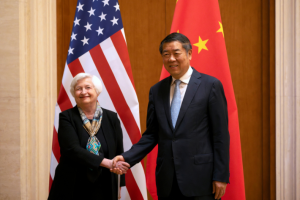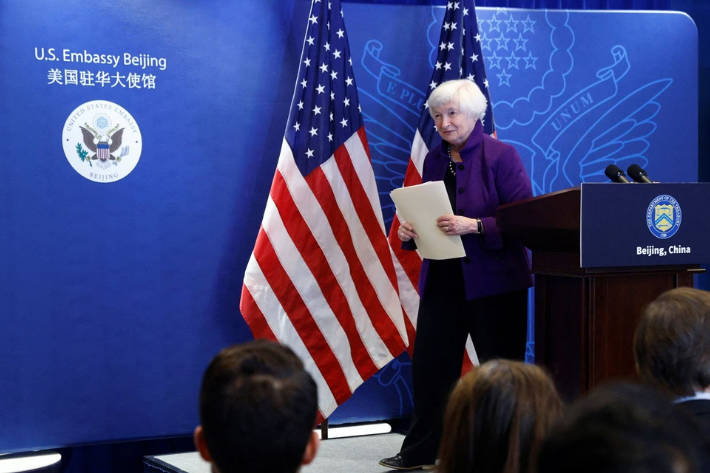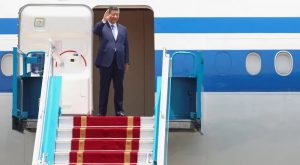US treasury secretary Janet Yellen briefed officials in China on the nature of upcoming investment restrictions in ‘sensitive’ Chinese sectors and said Washington’s actions would be narrow in scope.
Speaking to the press at the US embassy in Beijing on Sunday, Yellen said she had emphasised to her Chinese counterparts that any investment curbs would be “highly targeted, and clearly directed, narrowly, at a few sectors where we have specific national security concerns,” to avoid unnecessary repercussions”.
Yellen’s remarks came as she concluded a four-day trip to Beijing aimed at stabilising spiralling relations between the world’s two biggest economies.
Also on AF: China Says Regret ‘Unexpected Incidents’ as Yellen Urges Dialogue
Through the course of her visit, Yellen met with top Chinese officials who raised concerns about an expected US executive order restricting outbound investment.
Briefing reporters after the visit, a senior Treasury official said Yellen talked them through what such an order “might look like” and stressed that any executive order would not be for economic gain.
Yellen assured them that any such measure would be enacted in a transparent way, through a rule-making process that would allow public input, she said.
Speaking to reporters, Yellen said she also told Chinese officials they could raise concerns about US actions, so that Washington could explain.
The US would “possibly in some situations, respond to unintended consequences of our actions if they’re not carefully targeted,” she added.
Visit helped advance ties
Yellen said ten hours of meetings with her Chinese counterparts were “direct” and “productive” and that her visit helped efforts to put US-China ties on “surer footing”.
“The US and China have significant disagreements,” she said, citing Washington’s concerns about Beijing’s “unfair economic practices”.
“But President (Joe) Biden and I do not see the relationship between the US and China through the frame of great power conflict. We believe that the world is big enough for both of our countries to thrive.”
Yellen met with officials including Premier Li Qiang and People’s Bank of China Deputy Governor Pan Gongsheng, whom she referred to as the head of the central bank, appearing to confirm his expected promotion.

She also met US companies doing business in China, climate finance experts and women economists.
The visit aimed to establish and deepen ties with China’s new economic team, reduce the risk of misunderstanding and pave the way for cooperation in areas such as climate change and debt distress, Yellen said.
“I do think we’ve made some progress and I think we can have a healthy economic relationship that benefits both of us and the world,” she said, adding that she expected increased and more regular communications at the staff level.
The trip as expected did not result in specific policy breakthroughs, but was “very successful” in terms of “re-establishing contact” and building relationships, the senior Treasury official said.
Decoupling would be ‘disastrous’
In her meetings with officials, Yellen urged more cooperation between the sides on economic and climate issues while criticising what she called “punitive actions” against US companies in China.
She reiterated that Washington was not seeking to decouple from China’s economy, as doing so would be “disastrous for both countries and destabilising for the world.”
Asked about plans by Brazil, Russia, India, China and South Africa to create a common trading currency for their BRICS group, Yellen said she expected the dollar to remain the dominant currency in international transactions.
On Russia’s war in Ukraine, she told her Chinese interlocutors it was “essential” that Chinese firms avoid providing Moscow with material support for the war or in evading sanctions.
Also on AF: China’s New Anti-Espionage Law Puts Firms at Risk, US Warns
Relations between the two superpowers are at a low over a range of issues, including Taiwan and Beijing’s growing proximity to Russia.
Among Beijing’s most pressing concerns are Washington’s export controls on advanced chips and high-end chipmaking tools, designed to hobble China’s military and semiconductor industry.
Some US lawmakers are also mounting pressure on the Biden Administration for stronger action. A bipartisan group has proposed giving the government sweeping powers to block billions in US investment into China.
Beijing, meanwhile, has responded with several tit-for tat actions including recent export restrictions on two key chipmaking metals gallium and germanium and a ban on some sales by US chipmaker Micron.
Yellen’s visit is part of Washington’s efforts to repair ties with its biggest trading partner.
Secretary of State Antony Blinken visited Beijing last month, the first trip by the top US diplomat in Biden’s presidency. Climate envoy John Kerry is also expected to visit later this month.
The US diplomatic push comes ahead of a possible meeting between Biden and President Xi Jinping at September’s Group of 20 summit in New Delhi or a Asia-Pacific Economic Cooperation gathering scheduled for November in San Francisco.
- Reuters, with additional editing by Vishakha Saxena
Also read:
Curbs on Chipmaking Metals ‘Just The Beginning’, China Warns
US to Cut China Access to Amazon, Microsoft Cloud Computing: WSJ
Biden Urged to Hit Back at China Over Micron Ban, Rally Allies
China Curbs Mean Permanent Loss of Opportunities for US, Nvidia Says
China Raids Office of US Due Diligence Firm, Detains Staff
US-China Rivalry May Spur Decoupling of Chip Sector – BBC
























